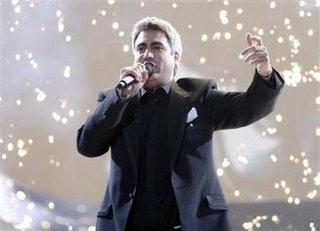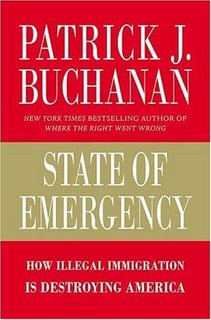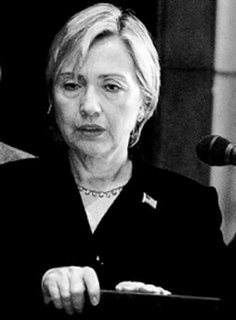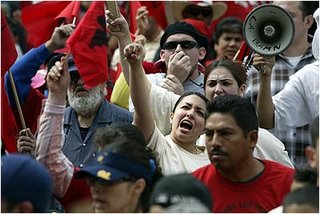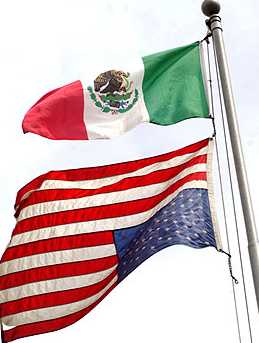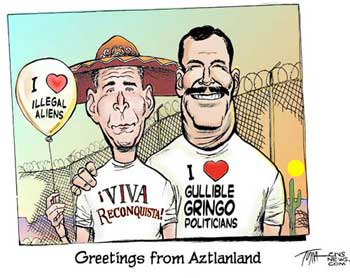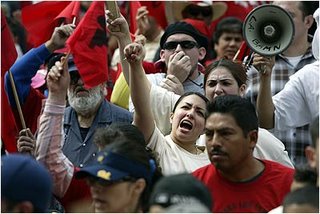31 May 2006
Disasterous: Most Un-PC &Tragic Mistake to Date
26 May 2006
The 'Ho's of State
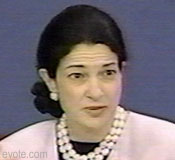



Yesterday, these old hens voted, along with 58 other deviants, to open the borders to additional illegal aliens.
Earlier this year, the House of Representatives, which was pressured by public opinion, drafted legislation to fix the gaping holes in our immigration laws. The raison d'etre for this legislation was to repair the deficiencies in the current immigration system.
Then Jorge Bush and the whores in the United States Senate hijacked the process and declared that they wanted a "comprehensive approach" to immigration reform.
The result? A Senate bill that would open the borders wide open to anyone who wants to walk or drive through the southern boundaries.
Either the House remains resolute in fighting to retain its version of the legislation, or let's just jettison the entire effort altogether. The status quo is better than this outrageous bill coming out of the US Senate.
25 May 2006
Thank You, Africa for Giving the World HIV/AIDS
AGED MAN CHOSEN AS "AMERICAN IDOL"
Nice Try, Slick Davy: We Ain't Buying Your Crap
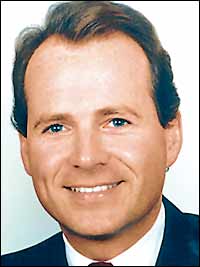 Above: Representative David Dreier (R-CA)--so handsome (lol) yet so flawed...
Above: Representative David Dreier (R-CA)--so handsome (lol) yet so flawed...Republican Representative David Dreier (CA-Glendora) is breaking ranks with Jorge Bush on the immigration issue. He is standing "tough" against a watered-down bill, which is expected to pass the House of Old Farts (US Senate) today.
Nice try, dude. You have been pro-illegal aliens for twenty years. This last-minute conversion doesn't hold water.
KFI radio shock jocks John and Ken have been breathing down Dreier's neck, and he is facing a tough re-election battle this year.
So out comes Tough Dave. Hah!
Unfortunately for us, there are enough voting dolts and morons in the Glendora district to buy Slick Dave's crap, and he will be returned to the House in November...
24 May 2006
Avian Flu's Kill Rate at 85%
In fact, the MSM have downplayed this story lest fear and riots should break out. But we think you deserve to know the whole truth...
Fairbank Report Poll: A Pill to Replace Meals?
23 May 2006
FAIRBANK REPORT TOP 2.5% OF WEBLOGS
Thank you so much to our loyal and ecclectic readership! To have achieved this feat after less than one year in existence is indeed thrilling and humbling.
Jonathan Fairbank
Editor-in-Chief
22 May 2006
Ted Hayes: American Patriot
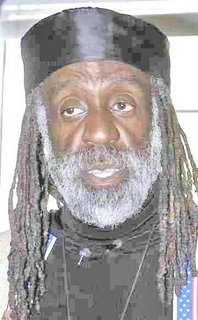
For years, Ted has been fighting for social justice on behalf of the Los Angeles homeless population. Now, he has extended his fight to include America's working poor, who are most adversely affected by the uncontrolled influx of illegal aliens into the United States. These American working poor are competing with the illegals for medical, educational and social benefits as well as entry-level jobs.
Numerous politicians speak on behalf of the illegals: the mayor of Los Angeles, the president of the United States and most Californian politicians.
Only Ted speaks for America's working poor.
Over the weekend, Ted held a rally in downtown Los Angeles and was nearly beaten up by illegal-alien thugs and their sympathizers.
Surplus Population: Ten Percent (Probably Higher) of Mexicans Live in the USA
19 May 2006
Hometown Hero Defends Freedom in Iraq
By Antonio Castaneda
ASSOCIATED PRESS
March 27, 2005
BALAD RUZ, Iraq – When villagers saw the cloud of dust from an approaching U.S. convoy, they hoped Iraq's new power brokers had come to solve problems: a broken well, a dilapidated school.
But the U.S. soldiers, mindful that their eventual departure hinges on robust local governments, directed villagers to local officials and elected representatives – a mind-bending concept for Iraqis formerly accustomed to all power flowing from Saddam Hussein in Baghdad.
In modern Iraqi history, local governments hardly have been the place to solve problems. Other groups – Hussein's Baath Party, the Iraqi army, tribal leaders, clerics – have been far more relevant to daily life.
"In Saddam's Iraq, everyone was encouraged to look to the center – and to a lesser degree the party – for action," said Phebe Marr, author of "The Modern History of Iraq."
The United States now is using millions of reconstruction dollars to repair the capabilities and image of local governments, a central component to an Iraq free of strongmen or bureaucrats who cater to segments of a diverse and fractured society.
"Everything we do, we try to put the Iraqi army, Iraqi police and local government at the forefront and give them the credit," said Capt. Chris Chang, a native of Los Angeles and a civilian affairs officer in the 278th Regiment of the 42nd Infantry Division.
City councils have emerged as a new power, channeling U.S. funds for reconstruction projects that pay local residents to build schools, hospitals and other public facilities.
The council members were chosen largely by U.S. officials, but they are hardly beholden to their American sponsors. In Balad Ruz, 45 miles northeast of Baghdad and near the border with Iran, council members meet with the U.S. military once a week to coordinate, but they do not report to them.
The process isn't always smooth, and frustrations can run high.
During one exchange in a small, smoky room, the Balad Ruz councilman chairing the meeting, a Turkmen named Maed Ruez, accused U.S. forces of not following through on projects, a sensitive allegation for soldiers who spend their days building water treatment plants and refurbishing mosques.
"Yeah, whatever," replied Capt. Dale Bradley, a native of Knoxville, Tenn., who then quickly gave a polished response before his interpreter could speak.
"Every time you've asked for things that I can control, I have delivered," Bradley said.
Despite the tension, the council chairman later voiced his support for the American forces.
The U.S. military's hands-off attitude and a central Iraqi government preoccupied by security crises have raised the profile of city officials such as Mohammad Maroof Hussein, the Kurdish mayor of Balad Ruz who once worked as an interpreter for U.S. forces.
"We had a city council before, but they had no authority," Hussein said between meetings with contractors, imams and U.S. soldiers.
Lt. Col. William M. Hart, who commands the 1st Squadron, 278th Regiment, 42nd Infantry Division that oversees the area around Balad Ruz, said he has only worked with local leaders – not officials in Baghdad.
But an expected, eventual decrease in U.S. funding as Americans pull out also could diminish the power that mayors and city councils enjoy.
"We do sit on top of the food chain," Chang said.
Other groups, including tribal leaders, are grappling for power. Insurgents have assassinated council members across the country, and a prominent Sunni leader in the area, Sheik Gazi al-Houm, recently told the U.S. Army that he would like permission to arm tribesmen.
Immediate crises also have forced U.S. soldiers to work with powers outside the civil government. When attacks have occurred in this area, U.S. forces have knocked on the doors of traditional tribal leaders who usually know more about their communities.
Congratulations, Marshall Scholars, Class of 2006
18 May 2006
UC Comp Scandal Highlights Public Sector Corruption
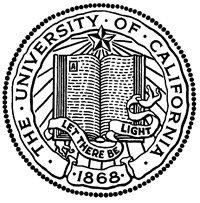
The University of California Compensation Scandal, which was first reported by the San Francisco Chronicle, illustrates the arrogance and hypocrisy and perhaps even corruption of senior mandarins who run our public institutions. There's one set of rules for the plebeians, and then there's another more favorable set of rules --or none at all-- for the mandarins in charge.
The Fairbank Report is not picking on the UC system. We are not even decrying the "high compensation" that certain officials are reaping from the University. We are, however, vehemently objecting to the two-track system, whereby senior mandarins reward themselves and their cronies huge sums of salaries and benefits without adhering to the rules they themselves impose on lower-level staff.
We are aware that this phenomenon exists throughout the public sector in California. County, city and court bureaucrats routinely place (incompetent) friends and relatives in high places in exchange for personal and, in some instances, sexual favors. In all these instances, there are stringent rules on the books, yet reports from the field indicate that senior bureaucrats routinely violate these regulations with impunity.
Either enforce the rules on everyone, or throw them out altogether. Enough with the two-track system!!!
17 May 2006
Mirror Image: The United Kingdom Wrestles with Illegal Immigration

Indeed, immigration is the greatest form of flattery and the best expression of confidence in a country. Both the UK and US governments are, however, struggling to deal with the unusually high rates of ILLEGAL immigration into their countries. The problems and approaches are, interestingly enough, quite similar...
http://news.bbc.co.uk/1/hi/uk_politics/4990626.stm
15 May 2006
Outrageous: Jorge Bush Seeks Permission from President Fox to Place Federal Troops in Some Border Areas!
12 May 2006
Check Out Google Trends
http://www.google.com/trends
Low Point: Bush's Approval Ratings Falling Faster Than Enron Stocks

He is now at 29% approval rating. This is what happens when you neglect your base. Will his hawkish speech on border security on Monday change the president's fortune? Please feel free to comment.
http://blogs.wsj.com/washwire/2006/05/11/bushs-approval-ratings/
11 May 2006
GOP to Lose the Support of Base in 2006 Congressional Elections?
In six months' time, the conservative base may do likewise, and the result will be defeat for the GOP in the Senate and possibly the House. See Peggy Noonan's powerful essay on this topic below.
http://www.opinionjournal.com/columnists/pnoonan/?id=110008359
10 May 2006
Enter the Dragon: The New Golden Age of Asian Cinema

By Monroe Chang
For years, I had given up on modern cinema. Hollywood's creativity and great story-telling ability have been replaced by raw sex and violence in order to attract the largest and basest crowd. In fact, over the last ten years, I only went to the movies twice or thrice. I resorted to viewing old films of the thirties, fourties and fifties.
Then came the DVD revolution, and I was introduced to a new genre of films, from Asia. These Asian films tell great stories in cinematographically stunning ways. I am referring particularly to legendary Chinese director Chen Kaige's TOGETHER. Chen, who achieved international acclaim for his FAREWELL MY CONCUBINE, directed this 2002 film about a boy musical prodigy and his country bumpkin father who travel to Beijing in search of fame and fortune. The story line is Dickensonian. Father and son meet a cast of strange and loveable characters in Beijing, including an eccentric music teacher who has a penchant for collecting street cats and a fashion-crazed call-girl who has a heart of gold.
The film's ending unravels into a (literally) tearful crescendo. All elements of the film neatly and spectacularly come together in the last five minutes. It is probably the most effective ending in films I have seen in the last quarter century.
The immense appeal of these Asian films is that they tell great stories through excellent cinematography--something that contemporary Hollywood has forgotten. The use of technology to create visual shock and awe, while interesting, is in the long run self-defeating. If there's no story to tell, then the flash and loud bang seem meaningless at best.
See also the review of Kim Ki Duk's SPRING, SUMMER, FALL, WINTER AND SPRING in the March Archives.
09 May 2006
A New Life for Nguyen Tuong Van's Singaporean Barrister

Editor's Notes: Nguyen Tuong Van, the 25-year old Vietnamese-Australian who was convicted of drug smuggling through Singapore, was subsequently hanged on December 2, 2005. Despite international pleas for leniency, the Singaporean authorities proceeded with the execution. See the November and December Archives of the FAIRBANK REPORT for extensive coverage.
After the pleas and tears
for Nguyen, a new beginning
THE AGE, Melbourne
May 1, 2006
By Steve Butcher
IN Singapore he stepped in to lead the emotional fight to save the life of Nguyen Tuong Van, alongside Melbourne barristers Lex Lasry and Julian McMahon. Now Joseph Thesiera's career has come full circle — thanks to the warm embrace of his new Australian legal mates.
It's the morning after Melbourne man Nguyen Tuong Van was executed in December, and his exhausted friends and legal team slump in the foyer of a Singapore hotel.
Some scan Nguyen's writings or gaze at his sketches collected from his death row cell in Changi Prison, others clutch his last, unopened letters.
Barrister Lex Lasry, QC, consoles Nguyen's Singapore lawyer, Joseph Thesiera, as he reads their client's diary.
Tears dampen the numbness as everyone tries to focus on flights home and a funeral and their lives continuing after years fighting for Nguyen's. Mr Thesiera last week ended a long journey — and began another — with his admission as an Australian lawyer in a ceremony at Victoria's Supreme Court.
That Mr Lasry moved his admission rang with irony as Mr Thesiera had similarly appeared for him in 2003 when the Queen's counsel applied for temporary admission to the Singapore bar to act for Nguyen.
After opposition from the local law society and the Attorney-General, the High Court refused the application. Mr Thesiera later acted as lead counsel at Nguyen's trial.
There were no such objections when Mr Thesiera, 41, stood before Chief Justice Marilyn Warren, Court of Appeal president Justice Chris Maxwell and Justice Peter Buchanan in the packed Banco Court.
"The court wishes you well in the journey that lies ahead," Chief Justice Warren told Mr Thesiera and other candidates who included the niece of Judge Frank Shelton of the County Court, the daughters of three lawyers, and journalist Michael Magazanik.
It is only the third time in more than 30 years that Mr Lasry has moved an admission.
"I just don't do it for anyone," the eminent lawyer said. "But we (who represented Nguyen) have all become great mates. I love Joe. He'll become a great asset to the legal profession."
When Mr Thesiera's master, Ramanathan Palakrishnan — Singapore's famous defence counsel — died suddenly in 2003, Mr Lasry, fellow barrister Julian McMahon and solicitor Theo Magazis turned to Mr Thesiera.
When they did, and unbeknown to them, they put Mr Thesiera in a bind, he had already begun steps to move to Australia with his wife, Sharon, and their daughters.
Mr McMahon said: "It made it hard for him. What does he do? Refuse the brief or make all the applications to change countries and possibly jeopardise that by acting in a potentially explosive matter? Being the man he is he took the brief and was prepared to wear whatever consequences might flow from it."
Many months of unpaid work followed as Mr Thesiera, who had studied law in Singapore and England, helped defend Nguyen who faced execution under Singapore's mandatory death penalty for importing heroin.
In eight years, he and Mr Palakrishnan had saved just two of more than a dozen clients from the gallows. "I was a pupil of Pala's when I did my first death penalty case and his advice was never to get emotionally involved, but I always found that hard to do," Mr Thesiera said.
Nguyen's case has affected him more than any other. Mr Lasry recalled "Van adored Joseph who was like a brother to him".
Mr Thesiera's career, personal life, religion and relationships have all been affected by Nguyen: "What I experienced in those last few days, and especially the morning of the execution, has not gone away."
08 May 2006
UWA
05 May 2006
The Case for Flexible Fuel

Editor's Notes: Prof. Zubrin provides feasible and realistic, not quixotic, approaches to addressing the global energy needs.
An Energy Revolution
By Robert Zubrin
The world economy is currently running on a resource that is controlled by our enemies. This threatens to leave us prostrate. It must change-and the good news is that it can change, quickly.
Using portions of the hundreds of billions of petrodollars they are annually draining from our economy, Middle Easterners have established training centers for terrorists, paid bounties to the families of suicide bombers, and funded the purchase of weapons and explosives. Oil revenues underwrite new media outlets that propagandize hatefully against the United States and the West. They pay for more than 10,000 radical madrassahs set up around the world to indoctrinate young boys with the idea that the way to paradise is to murder Christians, Jews, and Hindus. It was men energized by oil-revenue resources who killed 3,000 American civilians on September 11, 2001, and who have continued to kill large numbers of Westerners in Iraq and elsewhere. We are thus subsidizing acts of war against ourselves.
And we have not yet reached the culmination of the process. Iran and other states are now using petroleum lucre to underwrite the development of nuclear weapons, and insulate themselves from the economic sanctions that could result. Once produced, these nuclear weapons could be used directly or made available to terrorists to attack U.S., European, or Israeli cities and military forces. This is one of the gravest threats to the next generation-and, again, we are paying for it ourselves with oil revenue.
Our responses to these provocations have been muted and hapless. Why? Because any forceful action on our part against nations like Iran and Saudi Arabia could result in the disruption of oil supplies that the world economy is completely dependent upon. We can't stand up to our enemies because we rely upon them for the fuel that is our own lifeblood.
And the situation is even worse below the surface. In addition to financing terror directly and indirectly, oil exporters are using their wealth to corrupt our political system. Important Washington, D.C. law firms and lobbying organizations have been put on the payroll of Arab nations to blunt any attempts at retaliation for their promotion of terrorism. Arab investors have made enormous buys in media organizations that could allow them to influence U.S. public opinion.
All this, however, is mere prologue. China and India are rapidly industrializing, and within a decade or two the number of cars in the world will double or triple. If the world remains on the oil standard, the income streams of many noxious oil exporters will soar. We will be impoverished to the same degree they are enriched. The vast sums transferred will not only finance global jihad and dangerous weapons development in the Middle East, but also increase potential for manipulation of the U.S. and Western economies. At currently projected rates of consumption, by the year 2020 over 90 percent of the world's remaining petroleum reserves will be in the Middle East, controlled by people whose religion obligates them to subjugate us.
In light of these realities, current U.S. energy policy is a scandal. There is no reason the United States should remain helpless, allowing itself to be looted by people who are using the proceeds to undermine us. A much higher degree of energy independence is possible, even apparent, yet victory is not being pursued. To see how insane our national energy policies have been, let's review recent failures. Then I'll describe a starkly better alternative.
CONSERVATION AND ALTERNATIVE-FUEL DAYDREAMS
Ritualistic calls by utopians, moralists, and environmental absolutists for energy conservation are utterly inadequate and doomed to failure. To see this, simply run the numbers. Every year, about 17 million cars are sold in the U.S.-roughly 10 percent of the worldwide total. Even if Americans were to buy only hybrid cars offering a 30 percent fuel saving over existing models, and none of them drove more, and there was no expansion in the U.S. vehicle fleet, this effort would result in only a 3 percent annual reduction in global gasoline use.
Conservation, however, offers no prospect of being even this effective. Most industry analysts predict a hybrid market share of less than 1 percent. At the same time, the total number of cars is increasing. Under any realistic conservation scenario, total gasoline consumption will continue to rise and the looting of our economy by oil producers will continue. Conservation through gasoline efficiency is, quite simply, a losing strategy. It is like trying to survive in a gas chamber by holding your breath. We need to break out of the gas chamber.
Today's favorite alternatives to oil are wind, solar, hydroelectric, and nuclear power. They each have strengths and weaknesses, but the bottom line is that these are all methods of generating electricity-and electricity is far from the central issue of energy independence. The United States has plenty of coal, and if necessary could easily generate all of its electric power that way.
The key to energy independence, rather, is liquid fuel to power cars, trucks, trains, ships, and airplanes. These vehicles are not mere conveniences; they are the sinews of our economy and the fundamental instruments of our military strength. Our civilization cannot be sustained without efficient liquid fuels, and there is no foreseeable prospect whatsoever of cost effective, large-scale generation of liquid fuels from wind, solar, hydroelectric, or nuclear sources.
The energy panacea of the moment is a concept called the "hydrogen economy." Theorists propose to transition U.S. energy usage to hydrogen-a common element which, when combined with oxygen, releases energy with only water as a waste product. With hydrogen, it is claimed, we can achieve not only energy independence but also an end to pollution and global warming at the same time. The concept is entirely fraudulent.
Hydrogen is not a source of energy. In order to be obtained, it must be made-either through the electrolysis of water, or through the breakdown of petroleum, natural gas, or coal. Either process necessarily consumes more energy than the hydrogen it produces.
When hydrogen is made by electrolysis, the process yields 85 units of hydrogen energy for every 100 units of electrical energy used to break down the water. That is 85 percent efficiency. If the hydrogen is then used in a fuel cell in an electric car, only about 55 percent of its energy value will be used; the rest is wasted to heat and so forth. The net result of these two processes: the amount of useable energy yielded by the hydrogen will be only about 47 percent as much as went into producing it in the first place. And if the hydrogen is burned in an internal combustion engine to avoid the high production costs of fuel cells, the net efficiency of this vehicle will be closer to 25 percent.
Hydrogen produced from hydrocarbons instead of water also throws away 40 to 60 percent of the total energy in the feedstock. This method actually increases the nation's need for fossil fuels, as well as greenhouse gas emissions. While hydrogen could also be produced by nuclear, hydroelectric, solar, or wind power, the process would continue to be dragged down by the fundamental inefficiency of hydrogen production. Such power supplies could always do more to reduce fossil fuel requirements simply by sending their electric power directly to the grid.
The bottom line is that hydrogen is not a source of energy. It is a carrier of energy, and one of the least practical carriers we know of.
Consider: A standard molecular weight (or mole) of hydrogen gas, when reacted with oxygen, yields 66 watt-hours of energy. Meanwhile, a mole of methane (the primary component of natural gas) produces 218 watt-hours of energy. An equal number of moles of both can be stored in a tank of equal size and strength. Thus, a car that runs on compressed methane will be able to store more than three times the energy, and travel three times as far, as the same car running on hydrogen. In addition, the methane would be cheaper.
In short, from the point of view of production, distribution, environmental impact, and ease of use, the hydrogen economy makes no sense. Its fundamental premise is at variance with the most basic laws of physics. The charlatans who are promoting hydrogen as a solution to our energy woes are doing the nation an immense disservice.
THE ALCOHOL SOLUTION
To liberate ourselves from the threat of foreign economic domination, undercut the financiers of terror, and give ourselves the free hand necessary to deal with Middle Eastern extremists, we must devalue their resources and increase the value of our own. We can do this by taking the world off the petroleum standard and putting it on an alcohol standard.
This may sound like a huge and impossible task, but with gasoline prices well over $2 per gallon, the means to accomplish it are now at hand. Congress could make an enormous step toward American energy independence within a decade or so if it would simply pass a law stating that all new cars sold in the U.S.A. must be flexible-fuel vehicles capable of burning any combination of gasoline and alcohol. The alcohols so employed could be either methanol or ethanol.
The largest producers of both ethanol and methanol are all in the western hemisphere, with the United States having by far the greatest production potential for both. Ethanol is made from agricultural products. Methanol can also be made from biomass, as well as from natural gas or coal. American coal reserves alone are sufficient to power every car in the country on methanol for more than 500 years.
Ethanol can currently be produced for about $1.50 per gallon, and methanol is selling for $0.90 per gallon. With gasoline having roughly doubled in price recently, and with little likelihood of a substantial price retreat in the future, high alcohol-to-gasoline fuel mixtures are suddenly practical. Cars capable of burning such fuel are no futuristic dream. This year, Detroit will offer some two dozen models of standard cars with a flex-fuel option available for purchase. The engineering difference is in one sensor and a computer chip that controls the fuel-air mixture, and the employment of a corrosion-resistant fuel system. The difference in price from standard units ranges from $100 to $800.
Flexible-fuel vehicles (FFVs) offer consumers little advantage right now, because the high-alcohol fuels which they could employ are not generally available for purchase. This is because there are so few such vehicles that it doesn't pay gas station owners to dedicate a pump to cater to them. Were FFVs made the standard, however, the fuel they need would quickly be made available everywhere.
If all cars sold in the U.S. had to be flexible-fueled, foreign manufacturers would also mass-produce such units, creating a large market in Europe and Asia as well as the U.S. for methanol and ethanol-much of which would be produced in America. Instead of being the world's largest fuel importer, the United
States could become the world's largest fuel exporter. A large portion of the money now going to Arabs and Iranians would instead go to the U.S.A. and Canada, with much of the rest going to Brazil and other tropical agricultural nations. This would reverse our trade deficit, improve conditions in the Third World, and cause a global shift in world economic power in favor of the West.
By promoting agriculture, FFVs also act as global cooling agents. Plants draw CO2 out of the atmosphere. They increase water evaporation, and the water vapor thus produced transports heat from the Earth's surface to the upper atmosphere, where most of it is released to space.
The use of alcohol also reduces air pollution. In fact, environmental advantages were the motivation for the initial development of the first FFVs in California in the 1980s. During the era of $1.50 per gallon gasoline, gasohol pleased ecological activists, but it was economically disadvantageous. Recently, however, the comparative economics of alcohol fuels and gasoline have changed radically.
Methanol can also be used as the raw material to produce dimethyl ether, a completely clean-burning diesel fuel which could be used by trucks, locomotives, and ships. Many cars could also eventually use diesel. Diesel engines are substantially more efficient than traditional internal combustion engines, and equal to anything realistically possible from far more expensive, and as yet impractical, fuel cells.
THE ECONOMICS AND TECHNOLOGY HAVE ARRIVED-NOW FOR THE POLITICS
Two developments make a rapid transfer to high-alcohol fuels possible. One is the recent rise of gasoline prices, making methanol and ethanol economically attractive. The other is a technological innovation: the development by the Netherlands
Research Institute for Road Vehicles of a sensor capable of continuously measuring the alcohol content in mixed alcohol/gasoline fuel, and using this information to regulate the engine.
With this breakthrough, some 4.1 million vehicles were produced between 1998 and 2004 capable of handling various alcohol/ gasoline combinations. That is already five times the number of gasoline/electric hybrids on the road, and vastly increased use of such vehicles could happen overnight, for just a few hundred dollars extra per vehicle (compared to many thousands more for hybrids).
The only sticking point is the non-availability of high alcohol fuel mixes at the pump. Filling stations don't want to dedicate space to a fuel mix used only by 1 percent of all cars. And consumers are not interested in buying vehicles for which the preferred fuel mix is unavailable.
This chicken-and-egg problem can be readily resolved by legislation. One major country has already done so. In 2003, Brazilian lawmakers mandated a transition to FFVs, with some tax incentives included to move things along. As a result, the Brazilian divisions of Fiat, Volkswagen, Ford, Renault, and GM all came out with ethanol FFV models in 2004, which took 60 percent of the country's new vehicle sales that year. By 2007, 80 percent of all new vehicles sold in Brazil are expected to be FFVs, producing significant fuel savings to consumers, a boost to local agriculture, and a massive benefit to the country's foreign trade balance.
ETHANOL OR METHANOL?
To date, all FFVs have been either methanol/gasoline designs or ethanol/gasoline designs. Combined methanol/ethanol/gasoline FFVs have not yet been produced. Their development poses only modest challenges, however. The question is, which alcohol would be the best one upon which to base our future alcohol-fuel economy?
Methanol is cheaper than ethanol. It can also be made from a broader variety of biomass material, as well as from coal and natural gas. And methanol is the safest motor fuel, because it is much less flammable than gasoline (a fact that has led to its adoption by car racing leagues).
On the other hand, ethanol is less chemically toxic than methanol, and it carries more energy per gallon. Ethanol contains about 75 percent of the energy of gasoline per gallon, compared to 67 percent for methanol. Both thus achieve fewer miles per gallon than gasoline, but about as many miles per dollar at current prices, and probably many more miles per dollar at future prices.
Methanol is more corrosive than ethanol. This can be dealt with by using appropriate materials in the automobile fuel system. A fuel system made acceptable for methanol use will also be fine for ethanol or pure gasoline.
Both ethanol and methanol are water soluble and biodegradable in the environment. The consequences of a spill of either would be much less than that of petroleum products. If the
Exxon Valdez had been carrying either of these fuels instead of oil, the environmental impact caused by its demise would have been negligible.
Ethanol is actually edible, whereas methanol is toxic when drunk. This difference, though, should not be overdrawn, since in an FFV economy, both would be mixed with gasoline. The breakdown products of both ethanol and methanol are much less noxious than those from petroleum, and both emit far fewer particulates when burned. Methanol, ethanol, and gasoline are about equal in the levels of nitrous oxide and carbon monoxide produced when they are burned. Since it is made exclusively from agricultural products, ethanol acts as counter to global warming. Methanol can as well, but only if its source is agricultural. Methanol produced from coal or natural gas has about the same impact on global warming as gasoline.
In short, either methanol or ethanol could be used very effectively, with roughly equal countervailing advantages. This has not stopped proponents of either fuel from vociferously arguing their unique advantage and pushing for FFVs based exclusively on their favored product. To date, the more effective faction in this debate has been the ethanol group, backed as it is by the powerful farm lobby.
Given this political support, and no decisive technical argument in favor of methanol, the question might well be asked: why not just go with the stronger side and implement an exclusively ethanol/ gasoline FFV economy? The answer has to do with the total resource base. If we want FFVs not merely to benefit farmers, but to make America energy independent, we need a larger production base than ethanol alone can deliver.
The United States uses 380 million gallons of gasoline a day. If we were to replace that entirely with ethanol we would have to harvest approximately four times as much agricultural output as we currently grow for food production. Now it is true that we don't need to replace all of our gasoline, at least not in the short term. Replacing half would make us substantially energy independent. Furthermore, future processes might eventually wring out higher ethanol yields per acre. Surplus ethanol from Brazil or other tropical nations could also be imported. Nonetheless, relying on ethanol alone would require putting under fresh cultivation an amount of land greater than what we now use for food production. This would cause many strains.
So if we are to use alcohol fuels to achieve energy independence, a broader resource base is needed. This can be provided by methanol, which can come from both a broader array of biomass materials and also from coal and natural gas. Methanol production from coal is particularly important, since coal is America's, and the world's, cheapest and most prevalent energy resource. The United States could power its entire economy on coal for centuries, and large reserves also exist in allied countries. Current coal prices stand in the range of three cents a kilogram, much cheaper than agricultural products, so methanol can be made from coal at low cost. By mixing it at various rates with ethanol over time, we can increase supplies, reduce prices, maximize environmental benefits, and vastly increase the flexibility of our alcohol economy. Insisting that future vehicles have the capability to burn both alcohols is thus critical.
Even with methanol in the mix, the shifting of the world from a petroleum to an alcohol standard would remain a great boon to farmers. Third World farmers as much as American growers would enjoy the benefits-not only from a vastly increased market for their products, but also from the collapse of petroleum prices (which currently threaten crushing fertilizer and tractor fuel prices). This adds a strong humanitarian case for the transition to flexible fuels.
By providing Third World populations with an extensive source of income, the alcohol economy would also give them the wherewithal to buy manufactured products from developed nations. We would end up selling far more tractors, harvesters, and hybrid seeds to Africans, for instance. That would improve economic outcomes for all nations.
THE MEGA FIX FOR WHAT AILS US
Energy conservation offers only a strained strategy for enduring economic oppression with very slightly ameliorated pain. Today's petroleum monopolists would still ultimately have us over a barrel. The ballyhooed hydrogen economy, meanwhile, is a hoax.
If we are to win the critical energy battle, there is only one way to do it. We must take ourselves, and the rest of the world, off the petroleum standard. Only by doing this can we destroy the economic power of our enemies at the very foundations. Only in this way can we transfer control of the future from those who take their wealth, pre-made, from the ground (and therefore have no need for education or freedom), to those who make their wealth through hard work, skill, and creativity (who thus must build free societies which maximize the human potential
of every citizen).
Our nation's founders stipulated that the purpose of our government is to provide for our defense, promote our welfare, and secure the blessings of liberty to ourselves and our posterity. In our current economic and military dilemma, decisive action for energy independence is one of the most dramatic steps we could take to achieve those ends. Congress should immediately require that all future vehicles sold in the U.S.A. be flexible-fueled, thereby launching us into an alcohol-energy future that holds promise like few other options within our grasp.
Dr. Robert Zubrin, president of the aerospace engineering and research firm Pioneer Astronautics, wrote The Case for Mars,and other books.
Tony Blur: Prime Minister to Resign Soon?

After a devastating defeat in last night's local council elections, PM Tony Blair is facing loud calls from within and without his Party to resign. But this defeat has little to do with the Iraq war (as some critics would like to conveniently connect) since the PM already faced that referendum over a year ago in the General Election. This has more to do with a number of petty scandals which had been plaguing Labour just before the elections.
Should the PM resign? No.
Will the PM resign? Probably.
03 May 2006
Et Tu, Jorge? Bush Caught In Flagrante Delicto
02 May 2006
01 May 2006
Law(less) Day: May 1, 2006

PRESIDENTIAL PROCLAMATION
Law Day, U.S.A., 2006
A Proclamation by the President of the United States of America
America's legal system is central to protecting the constitutional principles on which our Nation was founded. As we observe Law Day, we celebrate our heritage of freedom, justice, and equality under the law.
This year's Law Day theme, "Liberty Under Law: Separate Branches, Balanced Powers," honors the wisdom of the separation of powers that the Framers of our Constitution established for the Federal Government. Delegates to the Constitutional Convention recognized the risks that accompany the concentration of power and devised a system in which the Federal Government's authorities are divided among three independent branches. James Madison highlighted the importance of our Constitution's separation of powers when he wrote, "the accumulation of all powers, legislative, executive, and judiciary, in the same hands . . . may justly be pronounced the very definition of tyranny."
Throughout our Nation's history, we have been reminded repeatedly of the wisdom of the Framers' design. Our system of separation of powers has safeguarded our liberties and helped ensure that we remain a government of laws. Law Day is an occasion for us to celebrate our Constitution and to honor those in the judiciary and legal profession who work to uphold and serve its principles.
NOW, THEREFORE, I, GEORGE W. BUSH, President of the United States of America, in accordance with Public Law 87-20, as amended, do hereby proclaim May 1, 2006, as Law Day, U.S.A. I call upon all the people of the United States to observe this day with appropriate ceremonies and activities. I also call upon Government officials to display the flag of the United States in support of this national observance.
IN WITNESS WHEREOF, I have hereunto set my hand this twenty-eighth day of April, in the year of our Lord two thousand six, and of the Independence of the United States of America the two hundred and thirtieth.
GEORGE W. BUSH
Phoenix, Mexico
Los Angeles, Mexico
Anti-US Rally Fizzles in LA
MAY DAY in America, 2006
But the illegal alien who runs blogger.com actually has adversely affected my daily routine. Apparently, we cannot upload pictures for the day. It's news to me that illegal aliens have also penetrated the high-tech sector.
VIVA LA REVOLUCION.
SI, SE PUEDE.
VIVA STALIN...






